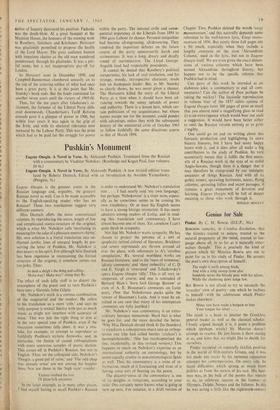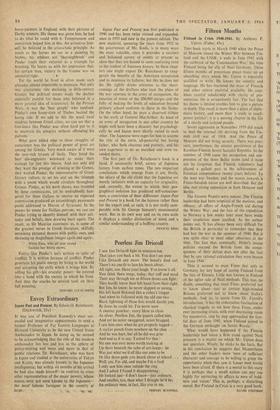Genius for Sale
Pindar. By C. M. Bowra. (O.U.P., 50s.) BERGSON remarks, in Creative Evolution, that 'the Greeks trusted to nature, trusted to the natural propensity, of the mind, trusted to -lan- • guage above all, in so far as it naturally exter- nalises thought.' This is precisely the kind of picture which Sir Maurice Bowra sets out to paint for us in his study of Pindar. He accepts the poet's own description of himself: The eagle is swift among birds, And with a long swoop from afar Suddenly seizes the bloody prey with his talons, While the chattering daws range low.
But Bowra is not afraid to try to reconcile the 'oracular' view of poetry—one which he inclines to himself--with the admissions which Pindar makes elsewhere:
Muse, you have madc'a bargain to hire Your tongue for silver . .
The result is a book to interest the Greekless general reader as well as the classical scholar. Closely argued though it is, it poses a problem which (perhaps wisely) Sir Maurice doesn't attempt to resolve. He just leaves it there staring at us, and hints that we might like to decide for ourselves.
Pindar occupied an especially ticklish position in the world of fifth-century Greece, and it was not. made any easier by his immense reputation amongst his contemporaries. On every side, he faced difficulties which sprang as much from politics as from the nature of his task. His busi- ness was, in the bulk of the poems that remain to us, to celebrate success in the Games- -at Olympia, Delphi, Ncmea and the Isthmus. In this he was acting a little like the eighteenth-century
horse-painters in England, with their pictures of Derby winners. His theme was given him, he had to do what he could with it. Temperament and conviction helped him in this. An aristocrat him- self, he believed in the aristocratic principle. As much as the horses we see in a painting by Stubbs, his athletes are `thoroughbreds' and Pindar treats their victories as a triumph for breeding. He leaves us with the impression that, for certain men, victory in the Games was an ancestral right. ; Yet the world he lived in often made such
attitudes almost impossible to maintain. Not only was aristocratic rule declining in ,fifth-century Greece, but political events made the decline especially painful for those who believed in a more general idea of aristocracy. In the Persian Wars, it was the 'best people' who medised. Pindar's own home-state of Thebes backed the losing side. If we add to this the usual. local rivalries between Greek cities, we can see that a free-lance like Pindar was often hard put to it to maintain his integrity without offending his patrons.
What gave added edge to these struggles of conscience was the political power of great art among the Greeks. Very much aware of it were the new-rich tyrants of Sicily. They lured the best die-engravers westward to make their coinage for just this reason. And not only did they want the prestige of winning at the Games, they wanted Pindar, the representative of Greek literary culture, to set his seal on the triumph with a poem which would circulate throughout Greece. Pindar, as his work shows, was troubled by these commissions, yet he undoubtedly hun- gered for them (failure to receive an expected commission produced an astonishingly passionate poem addressed to Hieron of Syracuse). In the poems he wrote for Sicilian patrons, we can see Pindar trying to identify himself with their atti- tudes and beliefs, then drawing back again. The result, as Sir Maurice convinces' us, is some of the greatest verses in Greek literature, skilfully entwining personal themes with public ones, and throwing up magnificent images again and again :
White Etna, who all year round Suckles her biting snows.
Poetry like Pindar's isn't written in 'spite of conflict. It is written because of conflict. Pindar generates his poetic energy by living in the world and accepting the strife which it brings him. By selling his gift—his oracular power—he entered into a bond with the society in which he lived. And thus the oracles he uttered took on their full meaning.
EDWARD LUCIE-SMITH































 Previous page
Previous page